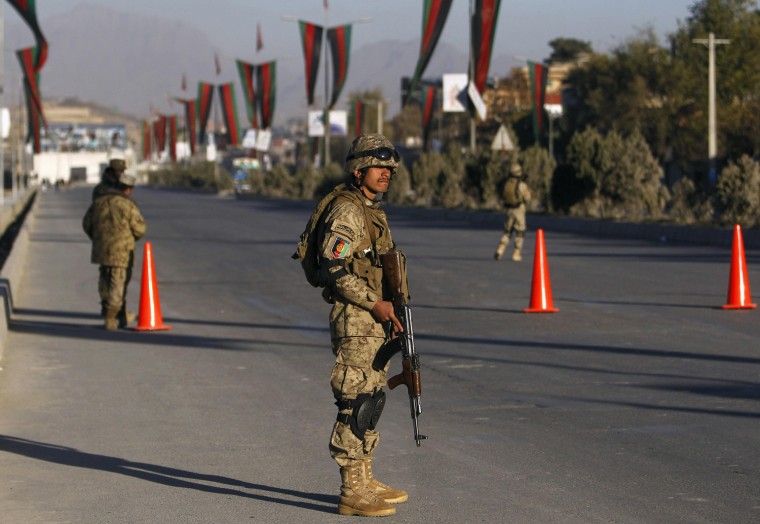KABUL — Secretary of State John Kerry on Wednesday said a final draft of key U.S.-Afghan bilateral agreement has been reached after a series of phone calls with President Hamid Karzai this morning.
The agreement would govern relations between the U.S. military and the Afghan government for years to come.
Secretary Kerry said it was up to the White House to decide if they would also send a letter to the Afghan people but he denied that the United States would apologize for American 'mistakes' in Afghanistan.
Some Afghan officials had said that a written apology was a requirement by Afghan president Karzai to sign the deal.
Kerry did not comment on whether the administration would send any additional communication to the Afghans.
Shortly before Kerry’s comments, the Afghan government released a version it described as final of the US-Afghan security agreement.
The deal is similar in both its wording and objectives to an earlier draft of the arrangement obtained by NBC News.
The new proposal, still to be approved by both the U.S. and Afghan administrations, calls for a sweeping, long-term relationship with the United States, committing Washington to paying to train and equip Afghan security forces, and establishes the groundwork keeping armed American outposts in Afghanistan.
The deal would extend to 2024 and beyond. It would effectively start a new phase of America’s war in Afghanistan, or as Wednesday's document says, “a new NATO-led Mission to train, advise, and assist the Afghan National Defense and Security Forces (ANDSF).”
There are, however, differences in the today's proposed deal and the draft obtained by NBC NEWS, in particular about strict limitations put on U.S. forces to conduct independent counter-terrorism operations in Afghanistan.
The Afghan document presented Wednesday says, “unless otherwise mutually agreed, United States forces shall not conduct combat operations in Afghanistan.”
And that point is repeated multiple times.
“The Parties acknowledge that U.S. military operations to defeat al-Qaeda and its affiliates may be appropriate in the common fight against terrorism," the agreement reads. "The Parties agree to continue their close cooperation and coordination toward those ends, with the intention of protecting U.S and Afghan national interests without unilateral U.S. military counter-terrorism operations.”
The agreement is highly significant because it outlines a broad, long term relationship with Afghanistan that commits the United States to sustaining the Afghan security forces for years to come, and likely deploying thousands of American troops in the country to carry out that training and the limited counter-terrorism role.
The training and security assurances called for the in document can not be done from afar. Afghan officials tell NBC News they want 10,000 to 15,000 American troops to remain in Afghanistan for at least a decade. U.S. officials have mentioned leaving about 7,000 to 8,000 troops in the war-torn country.
An original draft previous obtained by NBC News dated from last July and was a work in progress. It showed the annotations and notes of both Afghan and American negotiators and is revealing as a historic document.
The new draft was presented by the Afghan government without notes. We are including the full text of both documents for comparison. The July draft can be found here. The Afghan version, released Wednesday, can be viewed here.
Every country where the the United States maintains troops has a status of forces agreement. Afghanistan, however, appears to be a case apart. Afghanistan would be financially, and perhaps physically, dependent on its relationship the U.S. forces, which is not the case for Italy, Germany, Japan or other nations where the U.S. has a military presence.
Related:
